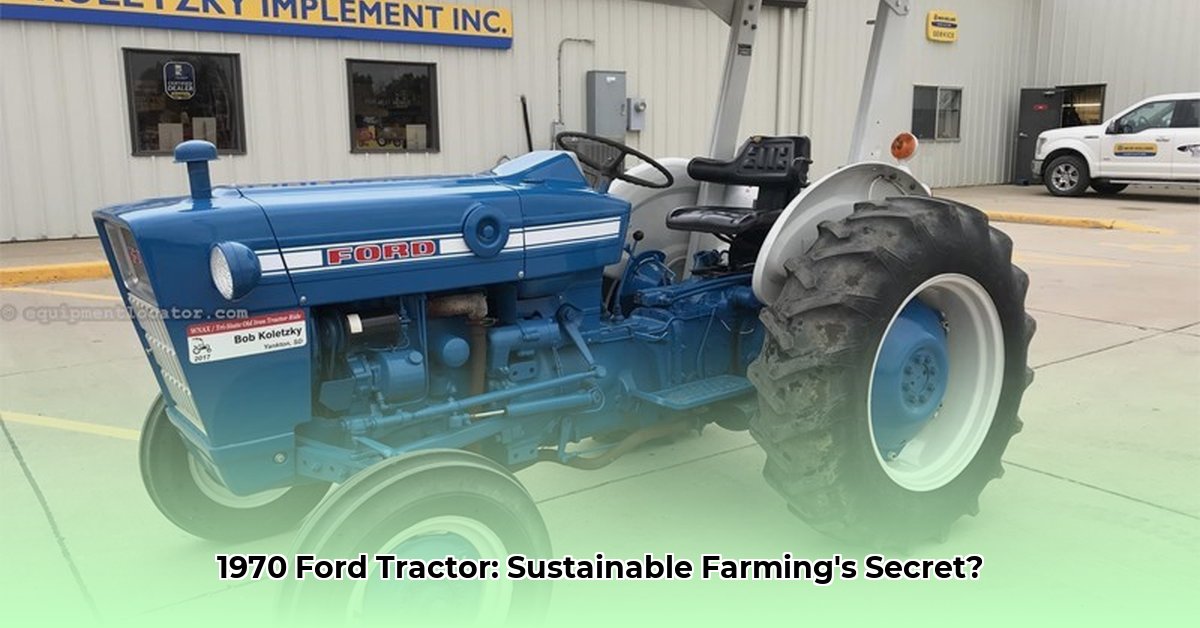
1970 Ford Tractor: A Legacy of Innovation
Imagine 1970: bell bottoms were in fashion, disco was on the horizon, and a quiet revolution was transforming American farms. At the heart of this change was the 1970 Ford tractor – a symbol of agricultural progress. This wasn't just another machine; it was a workhorse that redefined efficiency and durability, leaving a lasting mark on sustainable farming practices. This article explores its history, technical advancements, and enduring impact on the agricultural landscape. For more on early Ford tractors, see this early Ford models.
The 1970 Ford Tractor: A Workhorse of its Time
The 1970 Ford tractor wasn't a flash-in-the-pan design. It represented years of refinement, building upon Ford's earlier successes in agricultural mechanization. But what truly set it apart? Its combination of increased power, improved fuel economy, and robust construction dramatically altered farming practices. While debates continue among enthusiasts about whether it was the pinnacle of Ford's tractor designs, its impact is undeniable. The agricultural landscape was constantly evolving, prompting continuous design improvements.
More Power, Less Fuss: A Glimpse Under the Hood
The 1970 Ford boasted significant advancements over its predecessors. Increased horsepower allowed farmers to cultivate more land in less time, while enhanced fuel efficiency (a critical factor even then) reduced operating costs and minimized reliance on fossil fuels. Its durable construction ensured a long lifespan, reducing the need for frequent replacements and associated waste. Furthermore, easier maintenance reduced downtime and kept operational costs low. These weren’t mere incremental changes; they were game-changers.
Here's a closer look at the key features and their impact on sustainability:
| Feature | Description | Impact on Sustainability |
|---|---|---|
| Engine Power | Higher horsepower than previous models. | Increased efficiency; less fuel per acre cultivated. |
| Fuel Efficiency | Significantly improved compared to earlier Ford models and competitors. | Reduced fuel consumption, lowering running costs and carbon footprint. |
| Durability | Robust construction for extended service life. | Minimized replacements, reducing waste and long-term environmental impact. |
| Maintenance | Simpler design and easier access to parts. | Reduced downtime and maintenance costs. |
The Environmental Story: A Balancing Act
While significantly increasing crop yields, the environmental impact of the 1970 Ford tractor demands careful consideration. Early tractors, including some older Ford models, had considerable exhaust emissions. However, the 1970 model marked progress in fuel efficiency, translating to less fuel burned per acre and a smaller carbon footprint. Yet, the full environmental impact of these older machines remains a subject of ongoing research and analysis, highlighting the complexities of assessing long-term sustainability.
A Turning Point in Farming: The Broader Context
The 1970 Ford tractor wasn't an isolated event; it was part of a larger transformation in agriculture. This era witnessed a surge in mechanization, altering farming from primarily manual labor to a technologically driven process. This increased efficiency, while transformative, sparked debate about its environmental consequences. This is not simply a story about machinery; it's a narrative of how technology fundamentally changed our food systems.
How Did Ford Tractor Designs Influence Sustainable Farming Practices?
Key Takeaways:
- Increased efficiency and reduced labor demands directly contributed to sustainable farming.
- Durable tractors minimized environmental impact by reducing the need for frequent replacements.
- Improved fuel efficiency, although not perfect, was a notable step forward in reducing emissions.
- Ford’s mass production made mechanization accessible, creating both opportunities and challenges for land use and farming practices.
The Rise of the Mechanical Horse: Ford and the Revolution in Farming
Before the 1920s, farming was grueling manual labor. Then came Henry Ford’s Fordson tractor. Affordable, reliable, and relatively easy to use, it revolutionized agriculture. It's hard to overstate the impact of affordable mechanization. This made farming faster and arguably easier, indirectly supporting sustainable practices simply by enabling larger acreages to be managed by fewer people.
The 1970 Ford Tractor: Refinement and Efficiency
The 1970 model represented a significant refinement. Improved fuel efficiency meant getting more done with less fuel – a key factor in sustainability. Its durability meant a longer lifespan, further reducing the environmental impact associated with frequent replacements. This increased efficiency didn't guarantee sustainability; responsible land management remained crucial for preventing over-farming and soil degradation.
Beyond the Machine: The Broader Impacts
Ford's impact went beyond individual tractors. Mass production techniques made mechanization accessible, leading to higher agricultural yields but also prompting discussions about land use and potential environmental consequences. It's a complex legacy, with both positive and negative aspects.
A Legacy of Innovation: Looking to the Future
Ford's influence on agriculture remains substantial. From the affordable Fordson to the refined 1970 model, these machines significantly advanced mechanization. While Ford no longer manufactures tractors, its legacy continues to shape modern designs and practices. The ongoing pursuit of efficiency and sustainability in agriculture continues to build on the lessons learned from the past, driving innovation towards environmentally responsible solutions. The story of the 1970 Ford tractor is a testament to the ongoing evolution of farming and the enduring search for sustainable practices.